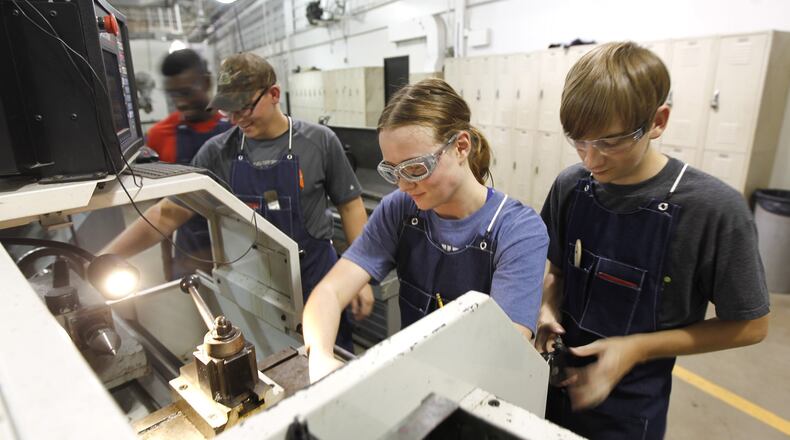“I think it makes a really strong case — telling a story about this sometimes obscure gem of a system,” state superintendent of schools Paolo DeMaria said Wednesday. “(Career tech) is designed to give students the opportunity to gain valuable technical skills that translate into great-paying jobs in an economy that needs them.”
RELATED: $150 million expansion under way for MVCTC
The 30-minute documentary uses the annual Skills USA state competition for career-tech students as a starting point, then tells the story of a few students’ pathways toward college and careers.
The Miami Valley Career Technology Center had five students advance to nationals from that state Skills USA event in categories ranging from robotics and automation to graphic commercial art. Asked if he thought most adults understand today’s career-tech offerings versus the vocational education programs of 30-plus years ago, MVCTC Superintendent Nick Weldy said, “No, absolutely not.”
“There’s such a difference, and some people don’t get beyond the stereotype,” Weldy said.
Rather than a home for struggling students, he said career tech centers have many students doing higher-level applied math than traditional high schoolers. “We have a number of our partner schools’ superintendents and principals and teachers who send their children here. … They understand the world’s changing.”
RELATED: New Greene Co. Career Center under construction
MVCTC and the Greene County Career Center are both in the midst of major expansions that will allow them to serve hundreds more students per year, in more career fields. That increase in volume is important.
In the documentary, educators and others discuss the “skills gap,” where many companies cannot find enough workers to fill available jobs because of candidates’ lack of technical skills or even soft skills such as communication. The American Trucking Associations said the industry was short 60,800 drivers nationwide in 2018.
Robin Rutschilling, a manager at Clippard Instruments Laboratory, says in the documentary that his company partners with local schools to try to groom young employees.
“The equipment’s no good if we can’t get someone to run it or program it,” he said.
Weldy said he tells factory or shop owners that the skills gap exists in part because of an age gap.
RELATED: Jobs expert calls “skills gap” an epidemic
“I tell them, ‘You have a hair problem,’ … everyone there has either gray hair or no hair,” Weldy said. “We don’t have enough of the youth coming in (to skilled trade jobs), and we don’t have a big middle-age group. That’s where that skills gap is. You have these craftsmen who have mastered their trade, but they’re getting ready to retire.”
State education officials say no single path — whether career, military, two- or four-year college — is right for every student. Federal median income data continues to show that people with college degrees have higher incomes, on average.
But in the documentary, Anthony Carnevale of Georgetown University’s Center on Education and the Workforce says sometimes, “what you take determines what you make.”
For years, many parents pushed their kids toward four-year college whether or not they had a plan, or an academic major that was in demand. That left a shortage of younger people approaching career training and many young adults with heavy college debt and lower wages.
RELATED: High-tech skills, basic “soft skills” both in demand
DeMaria said some districts, such as Marion and Akron, have reshaped their high schools to focus on career tech opportunities aligned with regional job demand. He also emphasized the variety of pathways, as high school career tech students can go straight into the workforce, or get a little more training, or go to four-year colleges.
“Many times we think about high schools as places where students don’t feel engaged or they’re bored, or they don’t see the relevancy,” he said. “Kids are getting older and they’re really interested in what the real world is going to bring (so these schools) give students more exposure to the world of work and career-tech.”
Airing tonight
What: “The Career Path Less Taken”
When: 8 p.m. Thursday
Where: Dayton’s ThinkTV16
About the Author

